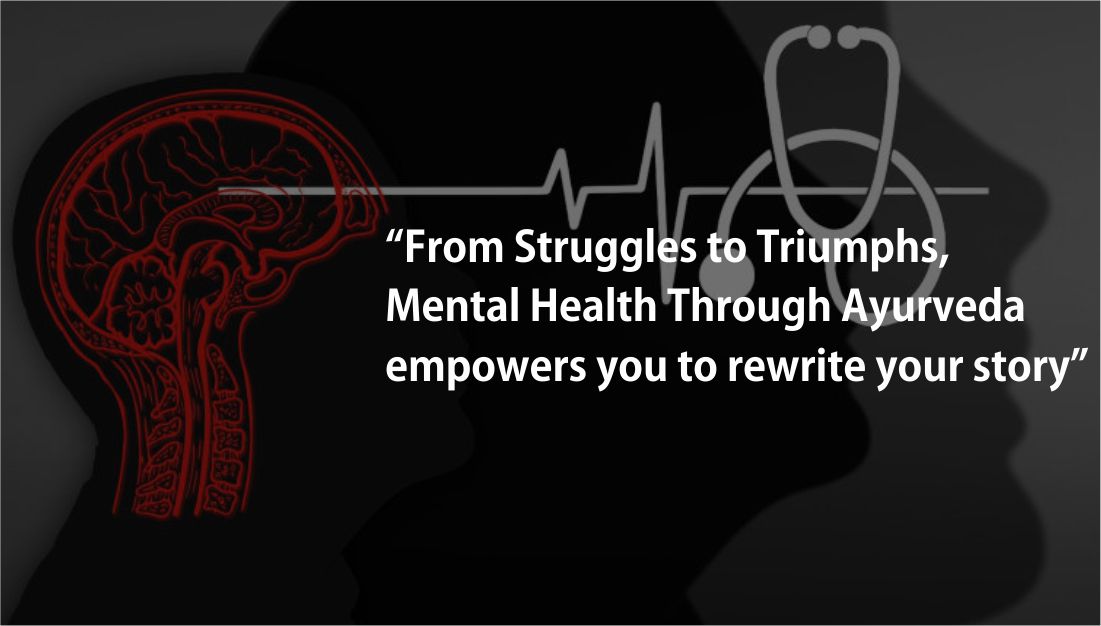
“From Struggles to Triumphs, Mental Health
Through Ayurveda empowers you to rewrite your
story”

Welcome to a journey of holistic healing and well-being through the ancient wisdom of Ayurveda. In the practice, I believe that true health encompasses not only physical vitality but also mental clarity, emotional balance, and spiritual harmony. With Ayurveda as our guiding light, we offer comprehensive support for mental health, helping you rediscover a sense of peace, resilience, and inner strength.
In Ayurveda, mental health is intricately woven into its philosophical foundation, which encompasses the principles of Triguna (three qualities), Tridosha (three doshas), and the concept of holistic well-being. Understanding mental health through Ayurveda involves exploring these philosophical concepts and their implications for maintaining harmony and balance in the mind, body, and spirit.
Triguna:
Ayurveda describes the universe and all its manifestations, including human beings, as composed of three fundamental qualities or Gunas: Sattva, Rajas, and Tamas. These Gunas represent different aspects of nature and consciousness, and their interplay influences all aspects of life, including mental health.
- Sattva: Sattva embodies qualities of purity, clarity, and harmony. It represents balance, tranquility, and a sense of inner peace. When Sattva predominates, the mind is calm, focused, and free from disturbances. Cultivating Sattva is essential for mental clarity, emotional stability, and spiritual growth.
- Rajas: Rajas represents qualities of activity, movement, and stimulation. It is associated with dynamism, passion, and desire. Excessive Rajasic energy can lead to mental agitation, stress, and restlessness. Ayurveda aims to channel Rajas in constructive ways while avoiding its excesses, which can disrupt mental equilibrium.
- Tamas: Tamas embodies qualities of inertia, darkness, and stagnation. It represents heaviness, lethargy, and ignorance. Excessive Tamasic energy can lead to mental dullness, depression, and apathy. Ayurveda seeks to alleviate Tamas and promote lightness, clarity, and vitality in the mind.
Tridosha:
Ayurveda identifies three primary forces or energies known as Doshas—Vata, Pitta, and Kapha— that govern physiological and psychological processes in the body-mind complex. Imbalances in these Doshas can manifest as physical ailments as well as disturbances in mental health.
- Vata: Vata is the energy of movement and communication, associated with the elements of air and ether. When Vata is imbalanced, it can lead to anxiety, fear, and scattered thinking. Ayurvedic treatments aim to balance Vata through grounding practices, nourishing foods, and calming therapies.
- Pitta: Pitta is the energy of transformation and metabolism, associated with the elements of fire and water. When Pitta is imbalanced, it can lead to irritability, anger, and judgmental behavior. Ayurvedic approaches focus on cooling and soothing Pitta through dietary modifications, relaxation techniques, and stress management.
- Kapha: Kapha is the energy of structure and stability, associated with the elements of earth and water. When Kapha is imbalanced, it can lead to lethargy, depression, and attachment. Ayurvedic interventions aim to invigorate Kapha through stimulating activities, energizing herbs, and lifestyle adjustments.
Holistic Treatment Modalities:
Ayurveda offers a holistic approach to mental health that integrates various treatment modalities aimed at restoring balance to the body, mind, and spirit. Some of these modalities include:
- Diet and Nutrition: Consuming a balanced diet tailored to individual constitution and imbalances helps to support mental health by nourishing the body and mind with essential nutrients and promoting digestive health.
- Herbal Medicine: Ayurvedic herbs and formulations are used to pacify Dosha imbalances, strengthen mental faculties, and promote emotional well-being. Herbs such as Brahmi, Ashwagandha, Jatamansi etc.are known for their calming and rejuvenating properties.
- Panchakarma: Panchakarma, a comprehensive detoxification and rejuvenation therapy, helps to cleanse the body of accumulated toxins (ama) and restore balance to the Doshas. It includes therapies such as oil massage (Abhyanga), herbal steam therapy (Swedana), and cleansing procedures (Shirodhara, Basti).
- Yoga and Meditation: Yoga asanas, pranayama (breathwork), and meditation practices are integral to Ayurvedic approaches to mental health. These practices help to calm the mind, reduce stress, and promote self-awareness, leading to greater emotional resilience and inner peace.
- Counseling and Psychotherapy: Ayurveda recognises the importance of addressing psychological factors in mental health. Counselling, psychotherapy, and lifestyle counselling are used to explore underlying emotional issues, develop coping strategies, and promote positive behaviour change.
In summary, mental health in Ayurveda is approached holistically, considering the interplay of Trigunas, Tridoshas, and various treatment modalities to restore balance and harmony to the bodymind complex. By nurturing Sattva, balancing the Doshas, and embracing holistic therapies, individuals can cultivate mental well-being, emotional resilience, and spiritual fulfillment in their lives.
If you're ready to embark on a journey of mental wellness and inner healing, we invite you to explore the transformative power of Ayurveda. Together, we'll co-create a personalised healing plan that honours your unique constitution, addresses your specific needs, and guides you toward greater vitality, clarity, and well-being. Looking forward to support you every step of the way.

